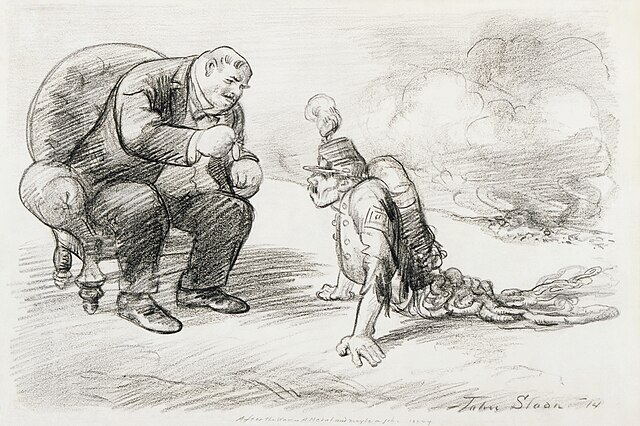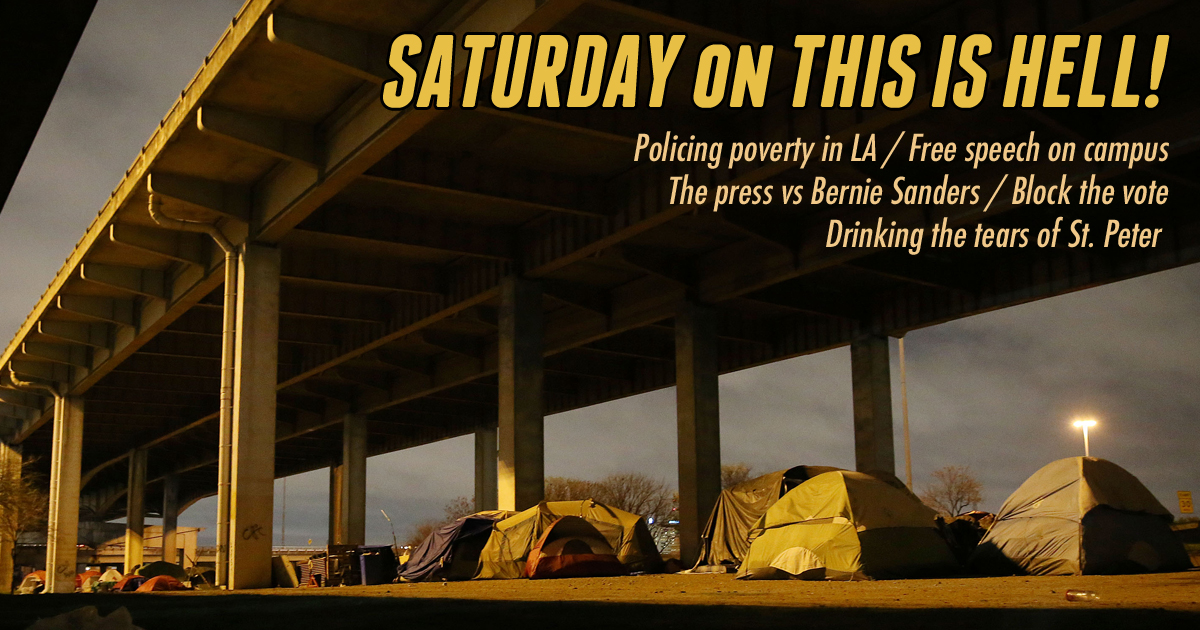TIH producers and staff share some of their favorite writing / stuff on the 2016 election:
Chuck Mertz - After Trump [Robin D.G. Kelley / Boston Review] Trump’s election means more police brutality towards black people [Patrisse Cullors / Guardian] Electing Trump: the moment America laid waste to democracy as we know it [Gary Younge / Guardian] We must rethink globalization, or Trumpism will prevail [Thomas Piketty / Guardian] It was the Democrats' embrace of neoliberalism that won it for Trump [Naomi Klain / Guardian] Why the White Working Class Rebelled: Neoliberalism Is Killing Them (Literally) [Juan Cole / Truthdig]
Daniel Cox - Vengeance Is Mine [Dan O’Sullivan / Jacobin] November 10, 2016 episode [Behind the News with Doug Henwood]
Jeff Dorchen - Listening to Trump [Christian Parenti / Nonsite]
Brian Foley - President Trump: How and Why... [Jonathan Pie]
Kevan Harris - What Will and Won’t Constrain Trump [Richard Lachmann / Policy Trajectories]
Steve Horn - Revenge of the Forgotten Class [Alec MacGillis / ProPublica] Inside the Loss Clinton Saw Coming [ Edward-Isaac Dovere / Politico]
Theron Humiston - Trump: Tribune of Poor White People [J.D. Vance / The American Conservative]
Alexander Jerri - Saturn devours his young: President Trump [Salvage] President Trump [Delete Your Account]
Ed Sutton - White Nationalism Lives and All White People Need to Own It [Radfag] No President [Mark Greif / N+1]
Spencer Thayer - Clintonism the Future? NYT’s Political Science Fiction [Jim Naureckas / FAIR]
Julianne Tveten - Swat Team: The media’s extermination of Bernie Sanders, and real reform [Thomas Frank / Harper's] / A Blueprint for a New Party [Seth Ackerman / Jacobin]
Listen live from 9AM - 1PM Central on WNUR 89.3FM / stream at www.thisishell.com / subscribe to the podcast
9:10 - Writer Richard Seymour surveys the wrecked landscape of American politics after Trump.
Richard and his fellow editors at Salvage wrote the essay Saturn devours his young: President Trump.
10:00 - Journalist Michelle Chen profiles the millions of Americans who never had a vote.
Michelle wrote the article For Millions, the Election was Always Lost for Dissent.
10:35 - Doctor Zaher Sahloul reports on providing medical care to Syrians under fire in Aleppo.
Dr. Sahloul wrote about his experiences in the op-ed I'm a doctor in Chicago. Here's what I saw when I went to help in Aleppo for the Guardian.
11:05 - Journalist Trevor Timm explores the possibilities of President Trump's inherited surveillance state.
Trevor's most recent Guardian op-eds are Obama has handed a surveillance state and war machine to a maniac and If Donald Trump gets his way, his administration will be disastrous.
12:05 - Occupy Wall Street co-founder Micah White explains why political power will not be captured in the streets.
Micah wrote the essay Two Paths Forward at his website, and the op-ed Protests won't stop Trump. We need a movement that transforms into a party for the Guardian.
12:45 - In a Moment of Truth, Jeff Dorchen considers the election as failed hangover cure.
Jeff assured me that this piece killed the other night at his LA-based literary competition thing he does.
Listen live from 9AM - 10AM Central on WNUR 89.3FM / stream at www.thisishell.com / subscribe to the podcast
9:10 - Former CIA officer John Kiriakou analyzes the government's ongoing war on whistleblowers.
John wrote the recent article The FBI Isn’t Done With Me for Reader Supported News.
The Tears of Saint Peter
Welcome to the Moment of Truth: the thirst that is the drink.
Le Lagrime di San Pietro, the Tears of St. Peter, is a piece of choral music by Orlando di Lasso, composed in 1594. The text is by the Petrarchian poet, Luigi Trasillo, written about thirty-five years early. Wednesday morning I sat in Disney Concert Hall watching singers from the Masters Chorale, under the direction of Peter Sellars, rehearse the piece. I was lucky enough to have a friend among the singers, and it was she who'd invited me.
The singing and staging were sublime, and singing and staging covers just about everything about the piece, so it was a sublime experience. Supertitles appeared above the stage, and the text was also sublime. So imagine yourselves there, as a low-rent bum like myself, occasionally treated to sublime things due to having occasional truck with wealthy or brilliant people – my friend, incidentally, being brilliant rather than wealthy, and thus, despite her relatively humble, in Los Angeles terms at least, condition, seeming to exist solely among the sublime, having the sublime pour out of her, and channeling the sublime to others – and there you are, enveloped in the exquisite for a while before you must rudely collapse back into your rodent's nest of a life, which in many ways you've chosen, albeit you curse your choices several times every day.
You'll remember Peter denied Jesus three times before the cock crowed. He wasn't the brightest of the apostles. Jesus told him beforehand he'd do it, you'd think he'd have been on his toes, he'd see it coming like deja vu and at least try to thwart the prophecy, but never mind. He denied Jesus three times so he wouldn't get into trouble with the authorities. And Jesus looked into Peter's betraying eyes, and that look is the source of Peter's tears. Whenever he wakes up to the crowing of the cock, Peter recalls that look and starts to cry.
It's quite a look. It's like arrows. Jesus' eyes are like bows, and the gaze is arrows. Later the eyes are swift tongues, and Peter's eyes are ears. What is said wordlessly with that gaze is more than even the most canny ear could hear in a hundred years. Describing the recriminations communicated by this look would shatter the listener, says Trasillo, and so sing the singers in some kind of, I guess, Italian.
A couple weeks ago I spoke on this show about the way we derogate and discard moral idealism (as... read more
On This Day in Rotten History...
In 1618 – (398 years ago) – the Elizabethan courtier, politician, soldier, explorer, and poet Sir Walter Raleigh was executed by beheading in the Old Palace Yard of Westminster. In his sixty-five years, Raleigh had become one of the richest and most famous men of his time, having led troops in battle, headed expeditions to the Americas, founded an ill-fated colony in Virginia, and popularized the use of tobacco in England. But he’d also angered the wrong people, including Queen Elizabeth I, King James I, and the Spanish ambassador to England. Raleigh was imprisoned in the Tower of London more than once and spent several years of his life there, but he managed to use that time constructively — not only writing several books, but also conceiving a son. Raleigh’s execution drew a big crowd. When he was shown the ax blade that would kill him, he remarked: “This is a sharp medicine, a physician that will cure all my diseases and miseries.” He then lay down on the scaffold and yelled to the executioner: “Strike, man, strike!” Raleigh’s severed head was given to his wife, who carried it home in a leather bag and kept it in a cupboard until the day she died.
In 1929 – (87 years ago) – a rash of panic selling on the New York Stock Exchange, which had gone on for several days, reached its peak as the Dow Jones Industrial Average lost 12 percent of its value in a single day. Known as “Black Tuesday,” it was the worst day of the most severe stock market crash in US history. This failure of capitalism ushered in the Great Depression, which wiped out fortunes, threw millions out of work, and created material deprivation across the industrialized world. The depression would not end until, several years later, some thirty national governments declared war on each other and put their citizens back to work building ships, airplanes, weapons, and equipment for a global bloodbath that would last six years and kill an estimated fifty to eighty million people.
In 1971 – (45 years ago) – the Southern blues-rock guitarist Duane Allman, co-leader of the Allman Brothers Band, who also did session work with Aretha Franklin, Wilson Pickett, and other soul greats, was riding his Harley-Davidson motorcycle through the streets of Macon, Georgia, when he plowed into the end of a flatbed truck that had stopped... read more
Listen live from 9AM - 1PM Central on WNUR 89.3FM / stream at www.thisishell.com / subscribe to the podcast
9:10 - Sociologist Forrest Stuart examines the harsh policing of poverty in LA's Skid Row.
Forrest is author of the book Down, Out, and Under Arrest: Policing and Everyday Life in Skid Row -from University of Chicago Press.
10:05 - PEN America's Omar Safadi explores the tension between inclusion and free speech on campus.
PEN America released the investigative report And Campus for All: Diversity, Inclusion, and Free Speech at U.S. Universities.
11:05 - Writer Thomas Frank explains how the beltway media wrote off Bernie Sanders from page one.
Tom wrote the Harper's cover story Swat Team: The media’s extermination of Bernie Sanders, and real reform
12:05 - Journalist Greg Palast investigates Crosscheck, a massive Republican vote erasing program.
Greg's latest documentary The Best Democracy Money Can Buy: The Movie is screening in theaters and available online now.
12:45 - In a Moment of Truth, Jeff Dorchen drinks the tears of Saint Peter.
If you squint real hard you can sort of see Jeff pictured in Caravaggio's The Denial of Saint Peter.








